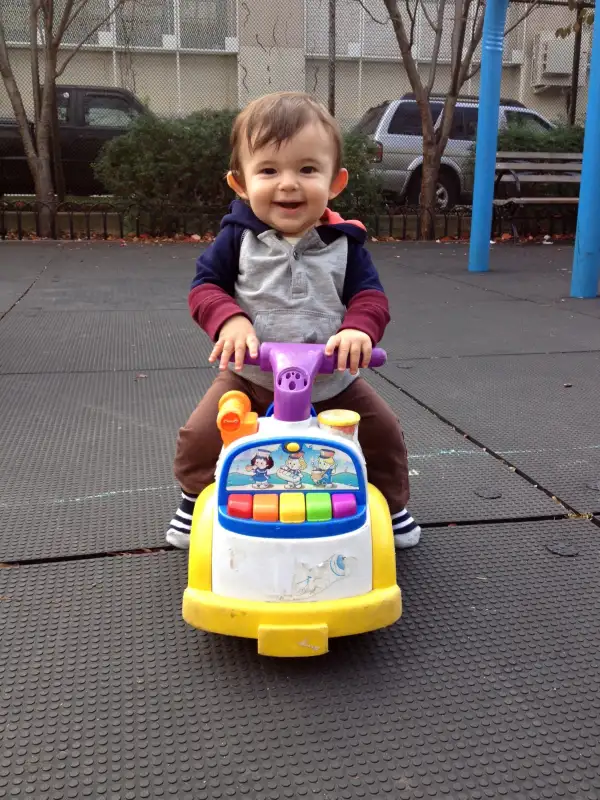Why You're Better Off With a Hard-Working Child than a Smart One

My son took his first steps the other day.
Not yet nine months old, Luke stumbled forward two paces as Mrs. Tepper prepared his evening bath. The next day, like a revved up toy racecar, the tyke zoomed five strides after I relocated him from the Jumperoo to the floor.
This achievement is a great source of pride in the Tepper household.
According to Babycenter.com, babies usually begin walking between 9 and 12 months. Luke was only 8 1/2 months—so he’s obviously smarter than the average bear and destined for riches and glory.
Ever since, my wife and I have indulged in a series of daydreams featuring Luke passing milestones well before other tiny mortals. Reading by age 2, dunking a basketball by 10 and garnering a Nobel Prize before he’s legally allowed to consume alcohol.
Of course we know we’re being ridiculous, but that’s part of the fun of parenting an infant—widely projecting all the things that he might accomplish that you never will. In so doing, we imagine a super-smart older version of Luke wowing the world with his intellect.
It turns out, though, we have it all wrong. Intelligence is valuable, obviously, but the more powerful skill parents should be instilling in their children doesn’t have anything to do with brainpower.
If we want him to maximize his earnings—and we do—studies show that we’re much better off emphasizing hard work and gumption.
What the Research Says
The Brookings Institute recently came out with a report that summarizes the research into the debate of character versus intelligence. Therein lay a panoply of statistics that illuminate importance of grit and drive.
For instance, high school grade point average is a better predictor of whether a student will complete college in six years than SAT/ACT scores. Grade point averages are all about grit: You have to come to class every day, turn in your homework, and perform well on tests and papers in order to earn a high grade. A standardized exam, like the SAT, mostly measures your cognitive abilities.
Another study Brookings referenced followed 1,000 children starting at ages 3 to 11 in New Zealand and found that later in life those who possessed more self control “were healthier, richer, less likely to be single parents, and less likely to be convicted of a crime as adults, controlling for childhood social class and IQ.”
Accurate, real-time salaries for thousands of
careers.
I asked Jessica Lahey, a teacher who writes a biweekly parenting column for the New York Times, for her perspective.
She said the research jibes with her experience. “Kids who are raised by parents with good impulse control—the ability to plan for long-term goals and stick to those goals—are more successful than kids raised by parents who model impulsive, disorganized, chaotic thinking and actions,” she says.
And what about smarts?
“A kid who has no ability to delay gratification, has no patience with momentary confusion or frustration, or simply never develops the frontal lobe function he needs in order to organize and plan his behavior is never going to be as successful as one who can," she says. "I don’t care how brilliant or talented he is.”
Why That Terrifies Me
For a parent, this is a little bit scary.
The idea that my son would be born with a particular IQ took the pressure off of me. However he comes out was how he was meant to come out; I couldn’t really mess him up.
But now, I need to instill a work ethic and character in him that I'm sure I don’t always live up to. My wife and I are only 28 years old and we’ve only just begun our careers; how are we supposed to have the authority to mold Luke into driven student and worker?
These are the things that keep me up at night.
But then I remember how far we’ve come since we found out Mrs. Tepper was pregnant.
We comparison shopped hospitals and doctors, and coordinated with health insurers and human resource departments. We’re following a kind of food progression chart so that he takes in as many different kinds of tastes as possible. We nurse him when he’s sick and hold him when he cries, and we do it every day no matter how little sleep we had the night before.
The act of raising a child (and we’re only in year one) absolutely filled us with fear before we had one. But like a frog in a slowly warming pot of water, we’ve adapted. We've found a way to weave Luke into our life.
Teaching him stick-to-itiveness, then, will just be another challenge we’ll (hopefully) slowly overcome with our infinite small decisions.
Taylor Tepper is a reporter at Money. His column on being a new dad, a millennial, and (pretty) broke appears weekly. More First-Time Dad:
- How to Cook a Real Dinner for Your Family...and Finish Before 9 p.m.
- Why Work-Life Balance is Just as Impossible for Dads
- Why I’m a Millennial Parenting Cliché
- Why Millennials Should Have Kids—and Soon
- Why You Should Bring Your Baby to a Bar
Read next: Injuries. Stress. Divided Attention. Are Coaches Damaging Our Kids?
